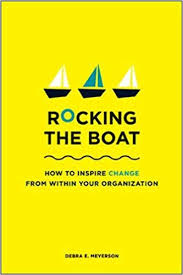Project Description

Rocking the Boat
Debra Meyerson was a professor of education and business and Stanford before a stroke first derailed and then redirected her career. Until then, she was best known for her work on tempered radicals who try to change systems by working from within as described in her 2008 book, Rocking the Boat. I found the book useful because it makes three points about men and women who seek profound change by working within existing institutions, in this case major corporations. Three points, in particular, stand out.
- Tempered radicals are individuals who find ways of maturing and striking a balance between their professional goals and changing the institutions they build their careers in. Many are content working behind the scenes and producing what Karl Weick called small or quick wins which, in turn, can be taken to scale. Their activities run along a spectrum in which, on one end they quietly resist and stay true to their values to organizing collective action on the other.
- Unlike the traditional adversarial movements that have received the most academic attention (at least from observers like me), they accept the reality that change comes through incremental steps that start with quick wins. Many are also adept at turning difficult situations into constructive ones by shifting from the role of bystander into change agents who make the organization function better for all concerned. This happens as they develop larger networks by either bringing existing employees onto their teams or by hiring new people—and often both.
- In the best of organizations, the tempered radicals themselves and others foster a culture of change that imbues the whole organization, thereby promoting a culture that stresses inclusion, innovation, and more. In essence, the tempered radical often leads by example more than by standing on a metaphorical soapbox.
It is not easy being a tempered radical. You are constantly torn by the pressure to fit in to your organization and remain true to your values.
But, then, again, it isn’t easy to be a less tempered radical either.
